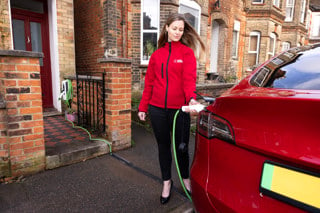Tom Rowlands, managing director global EV solutions at Allstar
Car and van fleets are increasingly efficient, but in recent years the need to limit their impact on the environment has become even more pertinent with the Government introducing plans to move to alternative fuels, improve air quality and cut carbon emissions.
The potential value for businesses of a sustainability manager follows a number of factors, most notably the deadlines imposed by the Government on the transition to electric and zero emission vehicles.
It has pledged that by 2035 all new cars and light commercial vehicles (LCVs) sold must be either pure electric vehicles (EVs) or hydrogen fuel cell EVs.
New petrol and diesel models will be banned from 2030 and new hybrids by 2035.
The transition to zero emissions is not solely a UK government initiative – at the COP26 environmental summit in 2021, nearly 30 governments, and dozens of states, manufacturers and fleets signed a declaration which said: “We will work towards all sales of new cars and vans being zero emission globally by 2040.”
It added that as business fleet owners and operators, or shared mobility platforms, “we will work towards 100% of our car and van fleets being zero emission vehicles by 2030, or earlier.”
Emerging requirements
While the global goal of a move to zero emissions will affect all business in the long term, fleets at some of the largest companies are already having to report their carbon footprint and environmental impact and sustainability managers are integral to this.
That’s because the Streamlined Energy and Carbon Reporting (SECR) programme requires energy and carbon reporting by businesses that are either required to prepare a directors report or meet two or more of the following criteria; 250+ employees, £36m+ annual turnover, or £18m+ balance sheet.
Such firms must report how much energy is used during the operation of the business, such as their total annual energy consumption, certain greenhouse gas emissions and their emissions intensity ratio.
Businesses must also show the actions they are taking to reduce energy usage and carbon emissions, as well as illustrate their methodology for calculations.
As a result, sustainability managers have a role to play in not only measuring and reporting current emissions, but looking at ways of reducing environmental impact in future through new ways of working and procurement.
What does a sustainability manager do?
There are three key areas within fleet operations that a Sustainability Manager typically concentrates on:
Vehicle usage
They will monitor if the fleet has the right number of vehicles for the operational needs of the business and whether those vehicles are being used in the right way.
Additionally they can look at routing and mileage to see if there are ways of reducing journeys and therefore emissions.
The path to zero emission
Part of the sustainability manager role is to identify opportunities via new technologies or alternative fuels that will support the company as it strives to meet the goal of zero emissions.
This means not only the fuel type but infrastructure and identifying the right vehicles, which will require striking a delicate balance between operational suitability and environmental impact.
Maximising efficiencies
A sustainability manager will ensure that the amount of fuel or energy being used is either reducing or at acceptable levels.
To do this they will analyse MPG, recording fuel purchasing and consumption, vehicle performance and maintenance.
The sustainability manager: an agent for change
It’s clear that for most businesses, the sustainability manager is becoming increasingly important, not just because they report on the current situation, but also provide the framework, and oversee the actions required for positive change – not only in the case of reducing a firm’s environmental impact but making it more operationally and financially efficient, too.




















Login to comment
Comments
No comments have been made yet.